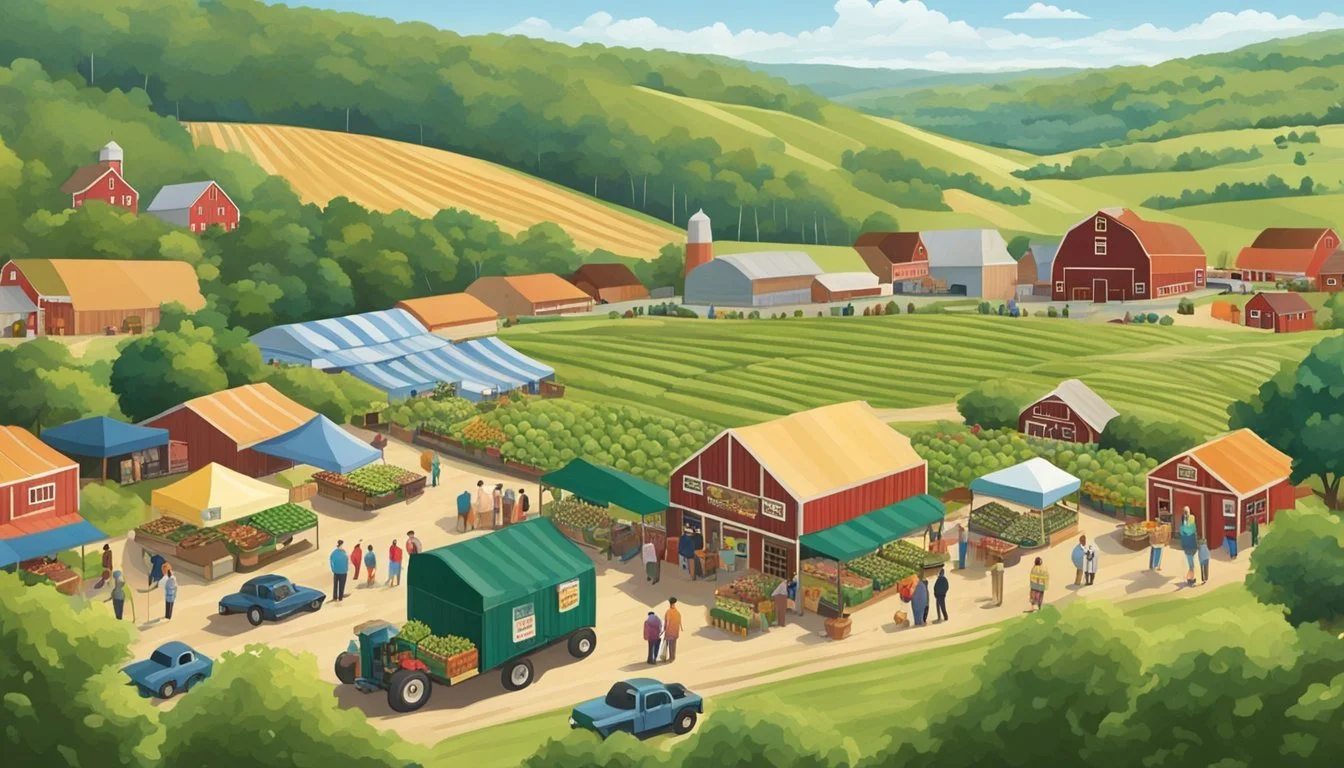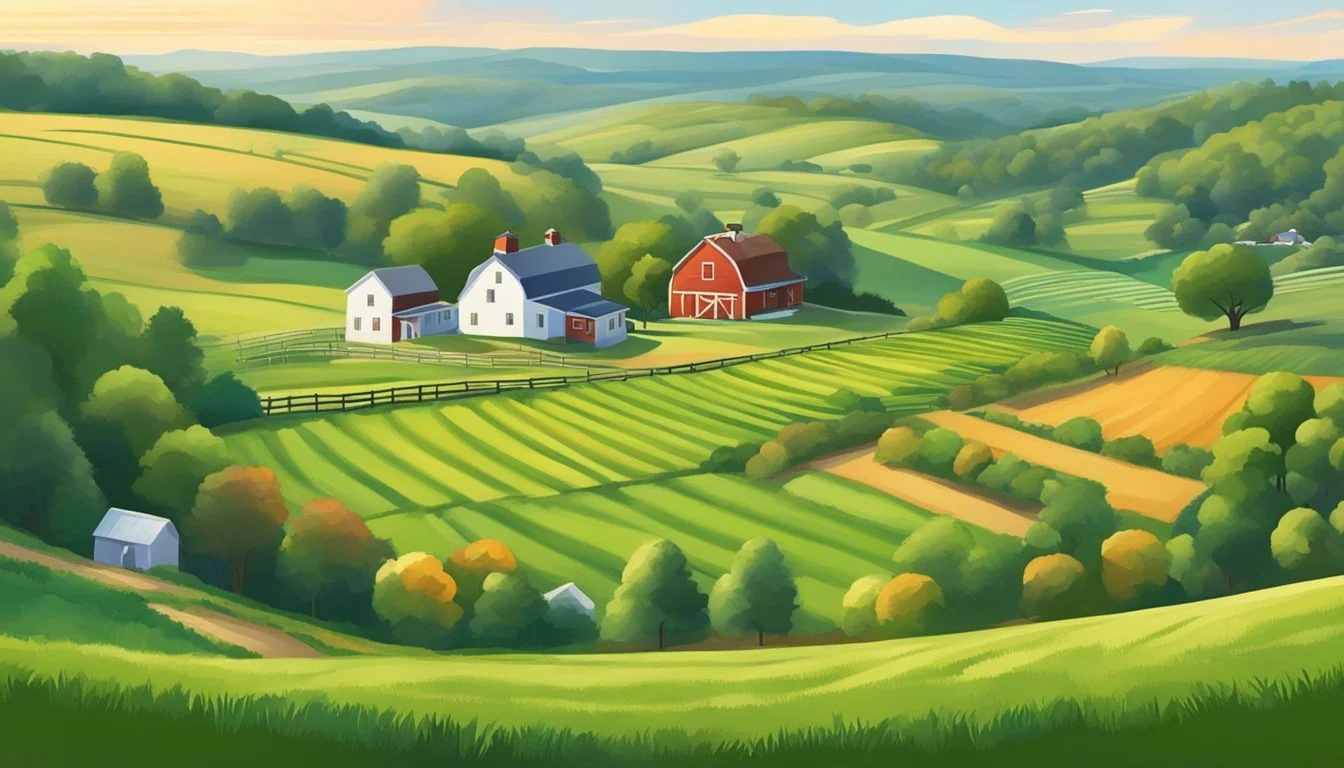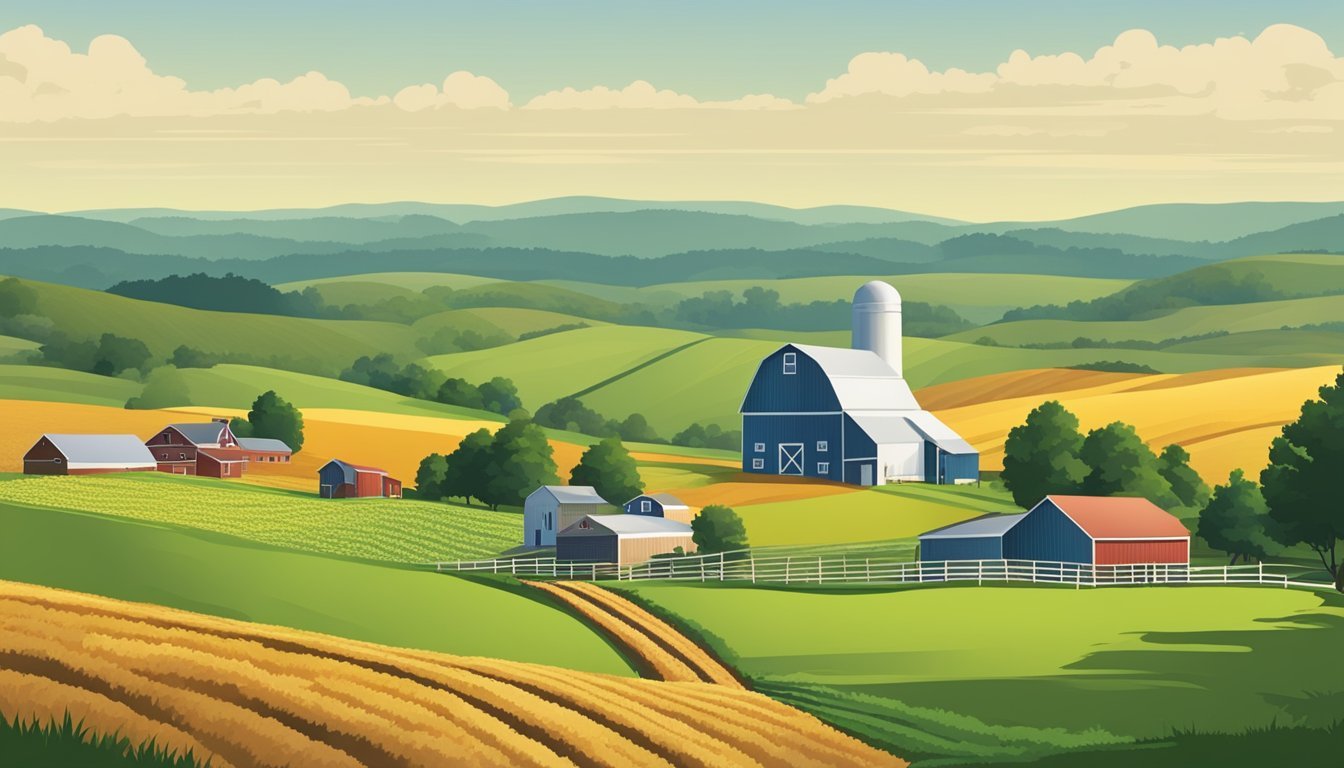Agritourism in Maryland
Exploring Farm-Based Leisure Opportunities
Agritourism, a blend of agriculture and tourism, offers a way for visitors to experience rural life and for farms to diversify their revenue streams. In Maryland, the concept has taken root across the state's diverse agricultural landscape. Farms are inviting the public to partake in activities ranging from fruit picking and hayrides to creamery tours and farm stays. These interactive experiences help people understand where their food comes from, all while enjoying the scenic backdrop of Maryland's countryside.
The state's commitment to agritourism is evident through initiatives like Maryland's Ice Cream Trail, including destinations such as Keyes Creamery and Prigel Family Creamery, where visitors can savor locally made ice cream and learn about dairy farming practices. Beyond these sweet treats, farms in Maryland also offer educational tours, horseback riding, and autumn-centric events like corn mazes and pumpkin picking. This direct connection between farmers and consumers enriches the community and bolsters the local economy.
Maryland's agritourism extends through various regions, each with its own charm. Enthusiasts can explore the Eastern Shore's beautiful vistas, participate in outdoor activities in the state's expansive woodlands, or choose a serene farm stay to unwind. By embracing agritourism, Maryland not only preserves its rich agricultural heritage but also adapts it to modern preferences, creating a vibrant, educational, and enjoyable sector for visitors of all ages.
Overview of Maryland Agritourism
Maryland's agritourism is a growing sector that bridges the state's rich agricultural heritage with diverse tourism experiences. This part of the local economy not only supports the preservation of farmland but also cultivates an appreciation of the state's farming traditions and agricultural practices.
State of the Industry
Maryland agritourism has not yet consolidated its resources into a real-time compendium, but it represents one of the rapidly expanding segments of direct marketing in agriculture. Despite the lack of a centralized database, the industry has seen notable growth, particularly in regions proximate to urban centers. Several Maryland farms, covering various sizes and production scopes, participate in agritourism. A significant number of these farms are smaller than 50 acres, and they cater to both direct sales and agritourism, offering activities like farm stays, educational tours, and participation in farm activities.
Farm Size: A large percentage of agritourism farms are under 50 acres.
Income: Many of these farms generate less than $10,000 annually from both direct sales and agritourism.
Product Diversity: These farms are involved in a variety of productions, from fruit and nut growing to vegetable cultivation, and even sheep and goat farming.
Defining Agritourism
Agritourism in Maryland refers to the act of visiting a working farm or any agricultural operation for enjoyment, education, or active participation in its activities. It offers tourists a chance to experience farming first-hand, learn about agricultural practices, and engage with local agricultural communities. Agritourism can include a range of activities:
Educational Activities: Learning about farming techniques, conservation efforts, and agricultural processes.
Recreational Opportunities: Enjoying open spaces, scenic landscapes, and the tranquility of farm life.
This section of the industry not only adds to the state's tourism appeal but also helps preserve its agricultural lands and cultural identity while providing a supplemental income for farmers.
Economic Impact and Trends
Agritourism has become a lucrative enterprise in Maryland, markedly contributing to the state's economy with revenues reaching approximately $1 billion annually. This sector combines agriculture and tourism to create a unique and profitable business model, meeting the demand for agritourism experiences.
Contribution to the Local Economy
Maryland's agritourism is a powerful income generator for local farms, boosting the economy by providing additional revenue streams through direct marketing to consumers. The University of Maryland Extension identifies that aside from the traditional farming income, agritourism offers varied opportunities for farmers to diversify and enhance their profitability.
Income: Farms integrate tourism with agriculture to boost earnings.
Enterprise: Agritourism-related activities span across farm visits, culinary tourism, and educational experiences.
Demand: Consumer interest in farm-originated products and farm experiences drives the market.
Growth and Development Trends
The industry is on a clear upward trajectory, projected to expand from a $150 million industry to a billion-dollar enterprise. Maryland's General Assembly's attention to defining "agritourism" underlines the sector's significance and potential for further growth.
Increased engagement in agritourism signifies a burgeoning market.
Diverse agritourism assets, yet to be comprehensively documented, reveal untapped potential.
Supportive policies are anticipated to sustain and accelerate industry growth.
COVID-19 Impact on Agritourism
The pandemic rearranged tourism priorities, significantly affecting agritourism in Maryland. However, as lockdowns eased, there was a resurgence of interest, with people seeking safer, outdoor, and socially-distanced activities, which agritourism could provide.
Pandemic: Initially disruptive, but ultimately led to renewed interest in outdoor, local travel experiences.
Agritourism enterprises adapted by implementing safety protocols, thus reinvigorating demand.
Agritourism Attractions in Maryland
Maryland offers a host of agritourism destinations that provide a variety of experiences from pick-your-own produce to navigating corn mazes. These attractions not only showcase the state's rich agricultural heritage but also offer educational and entertainment value for all ages.
Popular Agritourism Farms
Butler's Orchard: A family-owned farm in Montgomery County known for seasonal pick-your-own fruits, a large pumpkin patch, and festive events throughout the year.
Clark's Elioak Farm: This farm features petting zoo experiences and fairy tale-themed attractions, alongside its farm produce and meat products.
Unique Maryland Agritourism Experiences
Corn Mazes: Farms such as Lawyer's Winterbrook Farms in Thurmont provide intricate corn maze adventures in the fall.
Vineyards and Breweries: Maryland hosts several vineyards and breweries that offer tours and tastings, such as the Black Ankle Vineyards in Mt. Airy or Flying Dog Brewery in Frederick.
Creamery: South Mountain Creamery in Middletown invites visitors to learn about dairy processing and enjoy fresh ice cream.
Agricultural Education and Events
Agritourism in Maryland is bolstered through a variety of educational programs and events that aim to promote agricultural knowledge and practice. These initiatives are essential for sustaining agricultural traditions and encouraging public engagement in the farming sector.
UMES Extension Programs
The University of Maryland Eastern Shore (UMES) Extension plays a crucial role in agricultural education within Maryland. UMES Extension provides resources and training for farmers and agritourism business owners to diversify their operations. Their efforts are instrumental in helping those within the agritourism industry expand their knowledge and improve their services.
Maryland Agritourism Conference
The Maryland Agritourism Conference is a key event, organized by UMES's School of Agricultural and Natural Sciences, that brings together nearly 200 participants. Held in December 2023, the conference focused on identifying strategies to enhance agritourism in the state, and served as a collaborative space for sharing ideas and best practices among stakeholders.
Educational Tours and School Programs
Educational tours and school programs are critical components of agritourism, providing hands-on experiences for visitors and students. The University of Maryland Extension facilitates such programs, offering individuals a chance to learn directly from working farms. They help preserve scenic landscapes and farming traditions by educating the next generation on the importance of agriculture in Maryland.
Government and Private Sector Partnership
In Maryland, agritourism has benefited from a collaborative effort between government agencies and private entities, aimed at fostering growth within the sector through supportive policies and financial incentives.
Supportive Policies and Protocols
Maryland Department of Agriculture (MDA) and the U.S. Department of Agriculture (USDA) have implemented policies that bolster the agritourism industry. These policies are designed to streamline regulatory processes and encourage agricultural innovation. Government officials have played a pivotal role in shaping these policies, ensuring they facilitate business operations while preserving farmland and traditions. Private sector entities interact with these policies by adapting to standards that promote sustainable agritourism development.
Key Policies:
Reduced regulatory hurdles for agritourism events
Zoning adjustments for better land use
Enhanced agricultural land preservation initiatives
Grants and Funding for Agritourism
Grant programs from the MDA and USDA offer financial support for agritourism ventures, aiming to stimulate rural economies and maintain agricultural heritage. These grants are critical for farmers looking to diversify income streams and for private businesses seeking to invest in agritourism infrastructure.
Grant Opportunities:
MDA's Agritourism Grant Program: Financial support for marketing, infrastructure, and educational projects
USDA's Rural Development Programs: Funding for agricultural tourism as a rural economic development tool
Note: The availability of grants can vary, and interested parties are encouraged to consult with the relevant departments for current opportunities.
Best Practices and Sustainable Agritourism
In Maryland, sustainable agritourism encompasses practices that ensure environmental stewardship and community engagement. Adherence to these practices not only furthers Maryland's reputation for agritourism but also aligns with the broader goals of sustainability and local prosperity.
Environmental Sustainability
Sustainable Pathways: Farmers capitalize on practices such as crop rotation, conservation tillage, and integrated pest management to maintain soil health and biodiversity. They limit the use of synthetic fertilizers and pesticides to reduce environmental impact. Energy conservation measures and renewable energy installations, like solar panels, demonstrate a commitment to sustainable operations.
Water Management: Efficient irrigation and water conservation techniques are critical. Rainwater harvesting and drip irrigation are among the best practices adopted.
Waste Management: Composting organic waste and responsible manure management help maintain ecological balance. Agritourism sites often offer educational tours to highlight these practices.
Community Integration
Educators and Local Community: Agritourism operators in Maryland serve as educators, sharing knowledge of sustainable farming with visitors. Workshops on sustainable living and farming are commonplace, fostering a connection between the farm and the local community.
Supporting Local Economy: Farmers often collaborate with local artisans, food producers, and crafters, creating a symbiotic relationship.
Cultural Exchange: Agritourism is an avenue for cultural exchange, where the local community can share its heritage and traditions with visitors, strengthening community ties.
Farmers integrate best practices into their agritourism ventures to ensure a sustainable and enriching experience for all stakeholders, safeguarding Maryland's natural resources for future generations.
Marketing Agritourism Enterprises
In the landscape of Maryland's economy, agritourism enterprises are carving out an important niche by engaging visitors in authentic agricultural experiences. Effective marketing strategies are crucial in capturing interest and driving revenue, which is bolstered by the Maryland Office of Tourism's initiatives to promote statewide attractions.
Harnessing Social Media and Digital Platforms
Agritourism businesses in Maryland have tapped into social media and various digital platforms as powerful tools to reach a broader audience. Platforms such as Facebook, Instagram, and Twitter offer opportunities to showcase day-to-day farm activities, harvests, and events that draw in visitors. Utilizing these platforms, farmers share stunning visuals and engaging stories about their produce and experiences, crafting posts that resonate with their target demographic. This direct connection fosters a community around the farm and cultivates a sense of investment among visitors.
Key Strategies:
Regular posting: Keeping the audience engaged with frequent updates and seasonal highlights.
User-generated content: Encouraging visitors to share their experiences on their own profiles broadens the enterprise's visibility.
Engagement with followers: Prompt responses and interactions build relationships and customer loyalty.
Developing Strong Brand Identity
The establishment of a strong brand identity is essential for agritourism enterprises in Maryland to differentiate themselves in a competitive market. This includes having a coherent theme, ethos, and visual style across all marketing materials, from websites to brochures and signage. The brand identity should reflect the unique personality of the farm and convey the authentic experiences available to visitors.
Components of Brand Identity:
Logo and Design Elements: The use of consistent and distinct visuals that represent the farm's values and offerings.
Messaging: Clear, concise, and targeted language that speaks to desired visitors and conveys the farm's story.
Partnerships: Collaboration with the Maryland Office of Tourism and local businesses can amplify reach and establish a strong local network.
By investing in these marketing strategies, Maryland's agritourism enterprises not only attract more visitors but also enhance their overall significance to the state's tourism industry, driving both interest and revenue in a sustainable manner.
Future of Agritourism in Maryland
Maryland's agritourism is poised for growth, driven by emerging trends and pragmatic considerations of both opportunities and challenges.
Emerging Trends and Opportunities
Growing Maryland Agritourism is observed with initiatives like the University of Maryland Eastern Shore (UMES) Extension hosting conferences that gather stakeholders to focus on enhancement of the sector. These events spotlight Educational Priorities and Training Opportunities, aiming to fortify agritourism's future by equipping operators with the knowledge and skills necessary for success.
Critical Elements identified for the sector's growth include:
Infrastructure development
Real-time asset compendium
Adoption of best practices in operations
Diversifying agritourism offerings
Future Agritourism Development hinges on these elements, positioning Maryland to capitalize on the rising popularity of agricultural experiences among consumers.
Challenges and Considerations
Despite the promising trajectory, the segment faces issues that could temper its growth. Statutory clarity is needed as the Maryland General Assembly works to define agritourism more succinctly, which would aid in policy-making and regulatory processes.
Key challenges include:
Balancing economic benefits with community impact
Navigating liability and insurance landscapes
Ensuring sustainable practices amidst expansion
Stakeholders must closely engage with these considerations to foster an environment where agritourism can thrive without detrimental effects on the rural communities and their way of life.
Conclusion
Agritourism in Maryland presents a landscape of opportunities for stakeholders, including farmers, entrepreneurs, and the community. The University of Maryland Extension and the Southern Maryland Agricultural Development Commission (SMADC) among others, provide resources that support the industry. With agritourism's growing significance, farmers like Gaylon Adkins have found innovative ways to enhance their income through activities such as corn mazes and hayrides, contributing to the local economy.
The state's legislative adjustments, such as the bill approved by Governor Larry Hogan incorporating "camping" and "incidental outdoor stays" into agritourism, indicate a commitment to the sector's expansion. Although Maryland does not possess a real-time compendium of its agritourism assets, the trend suggests a positive trajectory for the accumulation and organization of such data.
For entrepreneurs seeking to immerse themselves in agritourism, Maryland offers an evolving platform with potential for growth. Synergies between traditional agriculture and tourism are fostering a dynamic environment where experiential and educational travel merges with farm life.
In essence, agritourism in Maryland is poised for sustained growth, benefitting a variety of stakeholders. While entrepreneurs navigate the fledgling policies, they do so with an infrastructure that advocates for agritourism's success and broadening prospects for economic development.
Note: This conclusion is based on available data and industry trends as of 2024, without exaggeration or unfounded claims.









